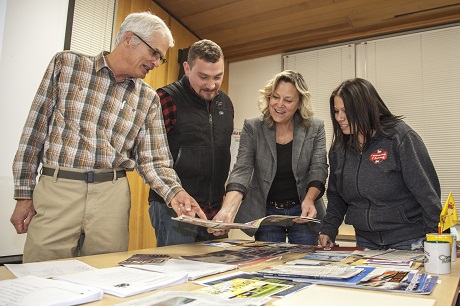The Business of Growing Business
Local companies turn to COCC’s Small Business Development Center to find the formula for success
The waters of the Deschutes River can serve as something of a metaphor in the business
world: fluid, yet sometimes unpredictable, always moving, with obstacles that occasionally
pop up, currents that redirect, and the ups and downs of exhilarating rapids.
Geoff Frank, owner of Tumalo Creek Kayak & Canoe, a paddling outfitter and guiding
company, makes his livelihood on the banks of the Deschutes, where his Bend shop has
been located since 2000. “Our whole mission is to create paddlers,” he said of the
busy company, which caters to all manner of boaters and floaters with gear, rentals
and instruction, and employs some 60 staffers in the summer.
But when Frank, who used to manage the shop, purchased the business from its former
owners in 2008, he found that managing and owning weren’t exactly analogous. So he
turned to a local business resource, the Small Business Development Center (SBDC), an arm of Central Oregon Community College, and enrolled in their Small Business Management Program.
“Jim Wilcox is really patient and helps break it down … he relates it back to your
business,” Frank said of the program’s instructor, citing the built-in mentorship
component as a huge help. “Being held accountable, it was surprising how valuable
that was.”
Wilcox helps businesses see the full picture. “Through the program, they understand
how all the pieces function together to form a synergistic whole,” he said, “as well
as understanding the functional areas of running a successful business – from planning
to marketing and sales, operations, employee management, accounting and finance.”
The management program, which runs a new cohort of up to 24 small businesses each
year (the next one begins in February 2020; sign-up interviews are taking place now),
unfolds over 10 months and involves three hours of class time and two hours of advising
each month, with a private monthly onsite session that’s tailor-made to the individual
business.
The program unravels weighty topics like marketing, management systems and cash flow.
“We also help a lot of businesses that need funding get to the next stage,” explained
Jerry Schulz, the SBDC’s director since January. “We’re familiar with several different
funding sources and can point them in that direction.”
Wilcox helps businesses see the full picture. “Through the program, they understand how all the pieces function together to form a synergistic whole,” he said, “as well as understanding the functional areas of running a successful business – from planning to marketing and sales, operations, employee management, accounting and finance.”
A former computer school owner who dropped out of an MBA program once he caught the
entrepreneurial “bug,” Schulz had 50 employees and worked with juggernaut companies
like Visa and Hewlett Packard before selling his business. With SBDC clients, he supports
individual success that leads to a cumulative impact. “What’s really gratifying is
seeing them bring that economic development to our communities,” he said.
Another past graduate, Travis Nagle, explained that the management program imparts
a fundamental shift in perspective. “It changed my focus from a mindset of working
in the business, to working on the business,” said the owner of Bend’s Family Choice
Urgent Care, an independent provider of medical care. “I found that hiring the right
people to do the jobs that I was doing was a worthwhile expense.”
For businesses that are in more of a fledgling phase, the SBDC offers both one-on-one
consultation and classroom instruction. Six advisors are located throughout Central
Oregon, teaching and consulting clients from Sunriver to Prineville. No-cost advising
sessions are available at all four of COCC’s campuses, in Bend, Redmond, Prineville
and Madras.
“Business Start-Up” classes ($29) cover basic topics in a concise two-hour format. “In Business Start-Up,
students choose which business structure is right for them and how to register with
the State of Oregon,” explained Maureen Quinn, one of the SBDC’s six advisor-instructors.
“We review the business plan, financial statements, goal-setting and good business
practices.”
“Launch Your Business” goes a bit deeper, examining marketing, cash flow, pricing and profitability over
the span of three evening workshops and three daytime sessions, with a cost of $199.
And the SBDC doesn’t work exclusively with small businesses. Scale Oregon is a program
aimed at Oregon traded-sector businesses with 10 or more employees. “Our Scale Oregon
advisors have experience with corporate processes and are a good match for businesses
poised for growth,” said Schulz.
For new businesses, of any size, reaching out for professional guidance is essential
for navigating unknown waters. “Statistics show that more than half of all new businesses
fail within the first four years,” said Quinn, whose team has worked with a range
of clients, from veterinary clinics to bakeries. “That number greatly diminishes when
new businesses seek help to start, grow and prosper.”
For Jake Guynup, who owns Grocery Bandit in Prineville, a purveyor of discount and
liquidation items, seeking help has paid off. “It has changed our thinking and helped
us increase gross sales and profitability,” he shared. “I’m surprised by how much
poor and mediocre advice and information I had from other people and small business
owners,” he said. “Business is hard enough with good advice and information – with
poor information, it’s brutal.”
For more information on COCC’s Small Business Development Center’s services and programs,
call 541-383-7290 or visit cocc.edu/sbdc.
By Mark Russell Johnson, COCC College Relations
Image: Jim Wilcox (left) and participants of the Small Business Management Program.

